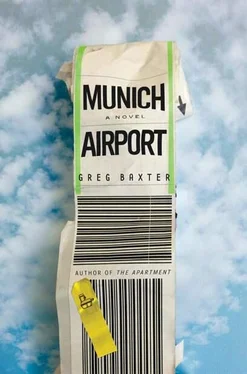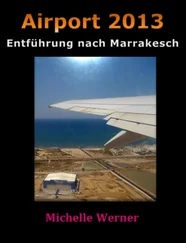We decided to take an elevator up to the Skywalk — a long, wide, glass corridor on the roof of the terminal. It was a hundred and fifty feet high, or something like that. It doesn’t sound very high, but it feels very high when you are up there, I’d bet. From it, on a clear day, we could have looked out in all directions, to the city, to the mountains, we probably could have killed a lot of time. But there was nothing to see. We stood close to the glass and examined the fog. I enjoyed feeling closely encapsulated by the grayness, it seemed vaguely like being in deep outer space — the outer space you might imagine near the boundaries of the universe. Everyone who was up there stood very close to the window, waiting, presumably, for signs of dissipation, or simply to observe the strange properties of this unusually thick fog. I had never seen anything like it. It seemed to move like a heavy gas, gas you could spoon out of a bowl, gas that would suffocate you if you stepped outside, or freeze you. My flat in London — the one in Spitalfields, though it is actually Hackney — is on the fourth floor. It overlooks Columbia Road and a small park. These were originally social housing, but by the time I moved there it was all architects, like the one I sublet from. I drink coffee by the window and look out over Columbia Road, or eat a sandwich, or have a drink if it is evening. Lots of bicycles go by. I play music quite loud and, on warm evenings, open the windows so that the sound will carry over to Columbia Road, so that people might vaguely hear something as they come closer, and enjoy an unexpected moment of romance in the city. I sometimes even go down myself — I leave the music playing, lock my door, go down the steps, open the outer doors, and walk until I can not hear the music anymore, then turn around and go back.
There is no more evidence of the fog. The mountains to the south, though far away, are clear and sublime. They are completely white. The sun is above them. The city is between us and the mountains, but you can’t really see it. There are just the runways, then some grayness, then, miles and miles away, the mountains. It must be very cold, despite how bright it is. I walk to the window and look out. I don’t have the energy to go back up to the Skywalk, and I presume it is busy now, I assume there are children running all over, people having picnics on the floor. But I wonder if, if I were to go back up, I could see the city. The tarmac is busy. Food trucks. Baggage transporters. Fuel and deicing trucks. Bundled-up airport personnel, with puffs of smoke for breath — the bald ones with steaming heads. A plane departs every sixty seconds. The queue of jets taxiing for takeoff is long, and it moves slowly. I imagine it must be a bit dispiriting to find yourself on an airplane after five or six hours of waiting, only to wait two hours on the tarmac, squashed in a seat you can’t leave.
When I arrived at the upscale apartment to which my father had moved us from the cramped little hotel with the green bathroom, the receptionist gave me a key and told me to go all the way up to the penthouse. The rooms had names instead of numbers. I went in, felt completely shocked by the size of the place, and read a note my father had left on the kitchen bar instructing me to grab a drink from the fridge and come up to the rooftop. Between two large sitting rooms, and opposite a giant, open-plan kitchen, was a south-facing terrace that was just level with the rooftops of the buildings all around, with a large table on it, some chairs, and a couple of recliners for sunbathing. There was also a spiral staircase leading up. I thought, You gotta be kidding me. I opened the fridge. There were six bottles of wine and several bottles of beer. I got a beer, searched in the cabinets for a glass, and went up to the rooftop. The rooftop terrace was totally bare, except for the chair my father was sitting on, and an empty chair beside him. Apparently the embassy intern had brought the chairs up at my father’s request. The weather was funny. It was still a cool, almost cold day, but from time to time a brief puff of warmth enveloped us. The sky was gray and very close. These were the very first intimations of spring. You are filthy, said my father. I looked down at my pants. The spots of superblack gunk went all the way up to my thighs, and had also spotted the front of my windbreaker, and the cuffs of my pants were wet and gritty. I had a pretty good beard already — relative to the fact that I’d never had one in my life. Maybe it had gunk in it, too. My father was in a suit, a black suit, and he was drinking wine. He looked serene. He was up there, on his own, just drinking and looking at the city. It was a spectacular view. We were nearly at the highest point of Prenzlauer Berg, which made it nearly the highest point in Berlin. Berlin doesn’t look much like a German city from street level. But from the rooftop terrace, Berlin looked German again, because of all the red rooftops, and vast. We’ve got the Philharmonic in a few hours, don’t forget, said my father. I haven’t forgotten, I said.
I drank that beer, got another, drank it, and when we heard thunder, we went downstairs. I said, I don’t get to hear thunder very much anymore. My father turned on the television and I went to shower and change. My room was enormous. It had its own flat-screen television. The bed was huge and square, as though I might like to sleep sideways, or bring multiple partners home with me each night. I also had an en suite, which was half the size of the bedroom — and as big as my sitting room in London. I felt a little bit silly sitting on the commode, looking around at all the empty space. I picked up my legs and kicked them, just because I could, and made funny faces in the full-length mirror across from the commode. I missed the old hotel.
I showered for a long time, under a massive tropical showerhead, and I made the water as hot as I could bear. When I came out, I was bright red, and I sat naked on the end of my bed for ten minutes, sweating. Then I put on the only suit I had brought with me — black suit, white shirt, black tie — which I had chosen in case my father decided to bury Miriam in Germany. I came out to find my father and Trish drinking wine and watching downhill ski racing on television. They stood. Trish wore a gray dress. In certain light, it turned black. You look very nice, I said. Thanks, she said, so do you. Four hours later we were back in our neighborhood, at a bar right beside Trish’s apartment, and not too far from our apartment, which was dark, crowded, smoky, and which played Jewish folk music until three a.m. We drank a lot. I must have talked to a dozen people, and I think I spoke a lot of German, which is interesting, because my German is very elementary. We walked Trish home, then we got a bit lost trying to find our new apartment, which was pathetic because Trish’s apartment was less than five minutes from ours. I helped my father into his room. I put him into bed. I took his shoes off. Then I went up to the roof and sat in the rain — under a complimentary golf umbrella — and drank a final beer, and up there, drunk, in darkness, I looked upon the wet and sparkling vision of the city, and it put me in mind of something I’d have liked to do in my youth. My father slept late. I woke, opened the blackout curtains to a bright blue late morning, and realized that I was not, to my surprise, hungover. And with that realization came the sound of bells, church bells, exaltation. I went outside to go shopping. There was a little café nearby that contained a small organic supermarket. You could get fresh produce, meats, and bread. The change in the weather was extraordinary. It was warm, the rain must have brought it. In the light, it almost felt hot. I took my sweater off and tied it around my neck. I bought food for breakfast. I got a little bit of everything. I went back to the apartment, and my father and I had eggs, bacon, mushrooms, broccoli, hash browns, beans, sausages, bread, and some coffee — all served on the rooftop.
Читать дальше











